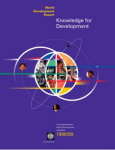Banque Mondiale (Washington, États-Unis). (1999). Le savoir au service du développement : Rapport sur le développement dans le monde 1998-1999. Washington (États-Unis) : Banque Mondiale. 279 p. (Rapport sur le Développement dans le Monde). Version papier en français, en ligne en anglais uniquement..
https://documents.banquemondiale.org/fr/publication/documents-reports/documentdetail/437511468166158678/rapport-sur-le-developpement-dans-le-monde-1998-1999-le-savoir-au-service-du-developpement-resume
https://documents.banquemondiale.org/fr/publication/documents-reports/documentdetail/437511468166158678/rapport-sur-le-developpement-dans-le-monde-1998-1999-le-savoir-au-service-du-developpement-resume
| Titre : | Le savoir au service du développement : Rapport sur le développement dans le monde 1998-1999 |
| Autre titre: | Knowledge for development: World development report 1998-1999 |
| in : | |
| Auteurs : | Banque Mondiale (Washington, États-Unis) |
| Type de document : | Série |
| Editeur : | Washington [États-Unis] : Banque Mondiale, 1999 |
| Collection : | Rapport sur le Développement dans le Monde, ISSN 0163-5085 |
| ISBN/ISSN/EAN : | 978-0-19-521118-4 |
| Format : | 279 p. / réf., cart., tabl., graph. |
| Note générale : | Version papier en français, en ligne en anglais uniquement. |
| Langues : | Anglais ; Français |
| Catégories : |
Thésaurus IAMM EDUCATION ; ACQUISITION DES CONNAISSANCES ; CROISSANCE ECONOMIQUE ; NOUVELLE TECHNOLOGIE ; TELECOMMUNICATION ; TRANSFERT DE TECHNOLOGIE ; INSTITUTION FINANCIERE ; INFORMATION ; ACCES A L'INFORMATION ; GESTION DE L'ENVIRONNEMENT ; ORGANISATION INTERNATIONALE ; DONNEE STATISTIQUE ; ENSEIGNEMENT SUPERIEUR ; INDICATEUR DE DEVELOPPEMENT ; PAYS EN DEVELOPPEMENT ; INTERVENTION DE L'ETAT |
| Résumé : | This is the twenty-first in the annual series assessing major development issues. This report acknowledges that knowledge, not capital, is the key to sustained economic growth and improvements in human well-being. It distinguishes between two sorts of knowledge: knowledge about technology, called technical knowledge or simply know-how, and knowledge about attributes, that is, knowledge about products, processes, or institutions. The report focuses on the relationship between the unequal distribution in know-how (knowledge gaps) across and within countries and the difficulties posed by having incomplete knowledge of attributes (information problems). In the first of three parts, the report discusses the importance of knowledge to development, and the risks and opportunities that the information revolution poses for developing countries. It then examines three critical steps that developing countries must take to narrow knowledge gaps: acquiring knowledge, absorbing knowledge, and communicating knowledge. Part 2 discusses the nature and extent of information problems, specific information problems, and three areas where information problems are most severe, namely in financial information, in environmental research, and in listening to the poor. Part 3 summarizes what knowledge and information requirements mean for developing government and international institution policies |
| Cote : | En ligne |
| URL / DOI : | https://documents.banquemondiale.org/fr/publication/documents-reports/documentdetail/437511468166158678/rapport-sur-le-developpement-dans-le-monde-1998-1999-le-savoir-au-service-du-developpement-resume |







